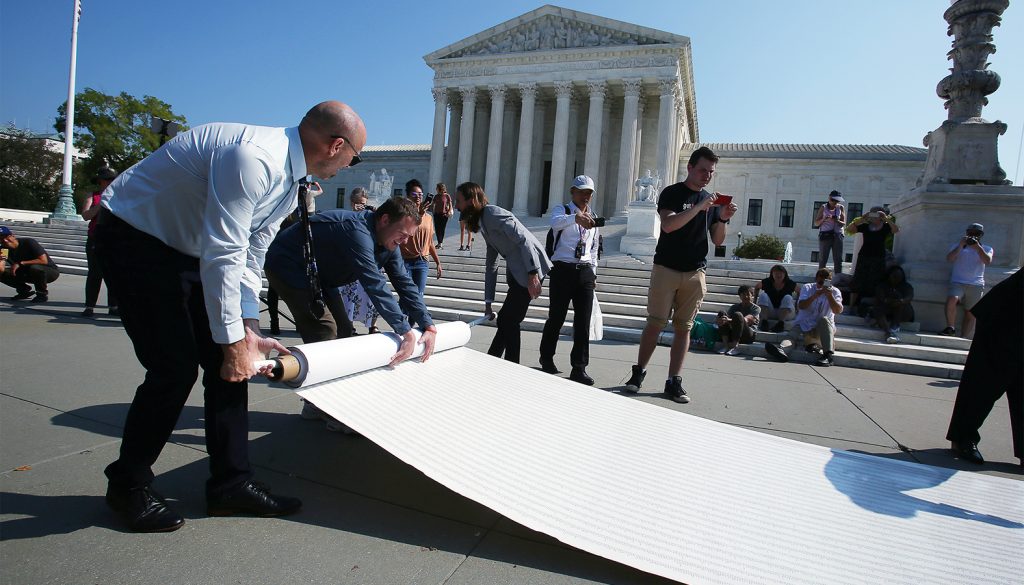The Supreme Court will consider an abortion case this term after it announced on Friday that it will hear a challenge to Louisiana’s abortion law.
Louisiana’s Unsafe Abortion Protection Act requires abortionists to have admitting privileges at a local hospital, defined as within 30 miles of the abortion clinic; when then-Gov. Bobby Jindal (R) signed the bill into law in 2014, it was promptly challenged in court.
“Abortion activists are more than willing to lower the bar on women’s health in order to expand abortion, but stricter clinic regulations are in the best interest of women,” Jeanne Mancini, president of March for Life, stated on Friday.
Mancini also noted the recent case of deceased South Bend abortionist Ulrich Klopfer, whose family discovered the remains of over 2,200 unborn children at his home in Illinois.
“We applaud the Louisiana bill’s sponsor Katrina Jackson as well as its other supporters for taking concrete steps to protect women in that state,” Mancini stated.
Planned Parenthood has said that Louisiana’s law could force the closure of some of the state’s few remaining abortion clinics. Something disputed by pro-life advocates.
Dr. Grazie Pozo Christie, a Policy Advisor for The Catholic Association, said the law did nothing more than provide common-sense protections for women’s health.
The law "ensures that women suffering from dangerous complications do not show up at emergency rooms where doctors who don’t know them can only guess at the surgical intervention that was done at the abortion facility," she said.
Other states such as Texas have passed similar regulations in the name of protecting women’s health, but the Texas law—which had included other requirements such as abortion clinics having the same standards as ambulatory surgical centers—was eventually struck down in the Court’s 2016 Whole Woman’s Health v. Hellerstedt decision.
In the Hellerstedt case, the court ruled that the Texas law created an “undue burden” on abortion access in the state, as it had decided in Planned Parenthood v. Casey that state abortion laws could not pose such an obstacle.
Regarding the Texas provision requiring admitting privileges, the court said in 2016 that such a “working arrangement” was already in place between hospitals and abortion clinics in the state, and that the provision forced the closure of around half the clinics in the state.
After the Supreme Court’s Hellerstedt decision, a district court permanently barred the Louisiana law from going into effect.
However, the U.S. Fifth Circuit Court overturned that decision in June Medical Services, L.L.C. v. Gee, and ruled that the Louisiana case sufficiently differed from the Texas case that the Supreme Court decision was not applicable on a like-for-like basis. The court in January denied a motion for a rehearing of the case.
In its decision, the Fifth Circuit said that the burdens the Louisiana law would impose on abortion access were vastly less than what the Texas law brought. “Few Louisiana hospitals” required a doctor to see a minimum number of patients in order to have admitting privileges, unlike in Texas where “almost all” hospitals had such requirements, the court said. While most clinics in Texas closed because of its law, “only one doctor at one clinic is currently unable to obtain privileges” in Louisiana, the court noted.
In February, the Supreme Court temporarily blocked Louisiana’s law from going into effect, after a petion from abortion providers and activists. The newest justice on the Court, Brett Kavanaugh, wrote a dissent from the decision to grant a temporary stay on the law, saying that the petition did not demonstrate a case for harm before the law had come into effect and that the public should be able to determine its effect.
In response to the court’s February decision, the chair of the U.S. bishops’ pro-life committee, Archbishop Joseph Naumann, stated that the law simply required “basic health standards” of abortion clinics, and that the court’s stay, together with the abortion industry fighting the law, “is further evidence of how abortion extremism actively works against the welfare of women.”
“Regardless of this disappointing ruling, the pro-life movement will continue to work and pray for the day when every legislature and court recognizes the brutal injustice of abortion—to women and their children alike—and our society sees abortion as unthinkable,” Archbishop Nauman stated.

